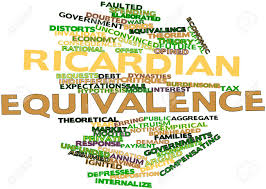Consumption purchases accounts for more than 60% of aggregate demand. Hence it is important to study it in detail. Consumption of an individual depends on the disposable income the consumer has. A consumer always find itself better with more disposable income than less. Disposable income is affected by many factors like saving factors, interest rate on other assets, tax cuts etc.
Ricardian Equivalence studies what actually happens to the consumption level when government influences the taxes. A tax cut will actually raise consumer’s income and therefore consumption will rise and saving will fall. But Barro-Ricardo hypothesis claim by contrast that changes in taxes would be precisely offset by an opposite change in private savings. The debate centers around an argument originally noted and rejected by David Ricardo in the 19th century which was supported in 1974 by Robert Barro.
Suppose for example budget is balanced initially and government decides to cut taxes. This will cause a budget deficit and will financed by borrowing. So the debt that is issued today must be retired next year or in some future years along with interest rate, and to repay the loan government will have to raise taxes in future. So Ricardian Equivalence implies that a tax cut today is equivalent to tax increase in future and hence it should not effect the consumption level of a consumer.
According to Barro-Ricardo theory taxes should be saved because consumers see themselves as recipients of tax cut but they see their future generations as responsible to payback tax and future generations are the children and grand children. But for this consumer should be rational and forward looking. But how forward looking consumers? Defenders of the traditional view of government debt believes that future taxes doesn’t actually have a large impact on current consumption, here are some arguments which support traditional view
1) MYOPIA – People are shortsighted because they don’t fully comprehend the implication of government budget deficit and according to Ricardian Equivalence people are thought to be rational and forward-looking.
2) BORROWING CONSTRAINT- If a person wants to consume more than his/her income but faces a constraint on borrowing from the bank ,then if government cuts taxes, his/her consumption will definitely goes up even though future income is lower.
Ricardian Equivalence explore the implications of expected future taxes on today’s decision to spend or save (consume or not to consume ). A tax cut today will anyway change the demand of a consumer, it makes sense for people to spend more , even if they fully anticipate the impplication of any resulting deficit or future taxes.
For the repayment of the debt, definitely the burden of the increased tax will fall on the future generation and that’s why people leave bequests for them. But it is highly unlikely that the considerations raised by Ricardian Equivalence will change the basic implications of Keynesian Fiscal policy.





15 Comments. Leave new
Nice work Prachi..
thanks stephy
all the info is nicely compiled
thankyou manisha
Nice
Good Work!!!
Well explained
Great work!
This a nice concept. Didn’t know about it. Thanks for posting and sharing your information with us.
very nice
Very well elaborated article.
Unique article article..!
Fasinating!
informative and very well written !
Well defined.
well written